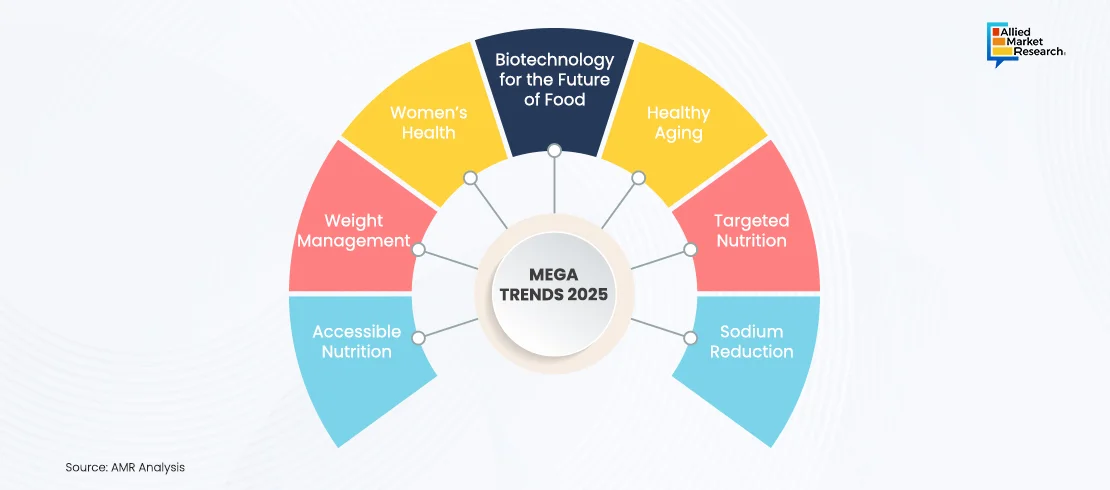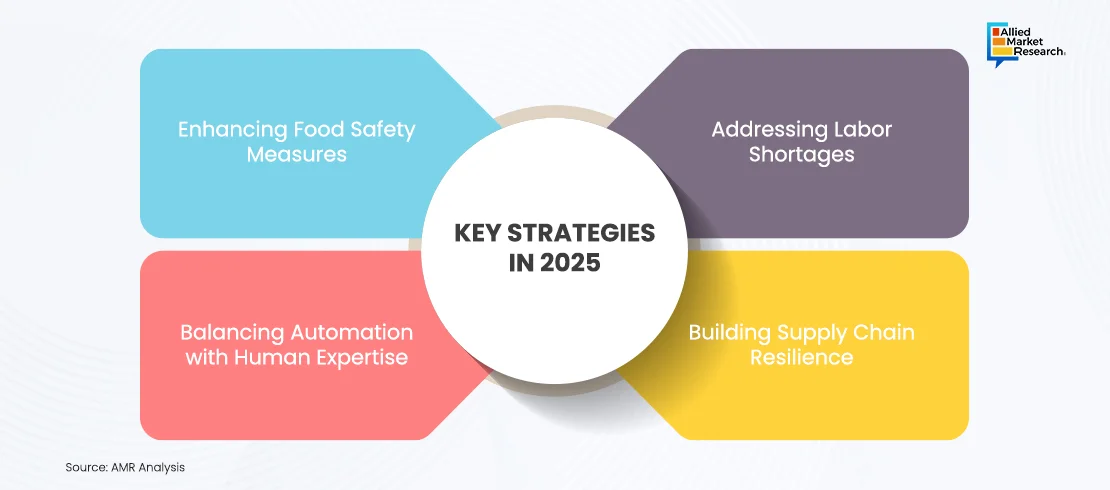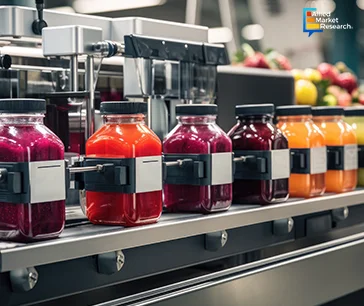Table Of Contents
- Focus on nutrition accessibility and women’s health reshaping the contours of the sector
- Increasing emphasis on labor welfare and supply-chain resilience impacting the domain positively
- Technology adoption and transition toward sustainability creating favorable conditions for the growth of the sector
- M&A deals and partnership agreements strengthening the foothold of the sector
- Ingenious product launches by key players opening new avenues for growth in the sector
- The essence

Roshan Deshmukh

Koyel Ghosh
Food and Beverages Domain in 2025: Understanding the Role of Latest Trends, Innovations, and Strategies in Expanding the Scope of the Sector

The food and beverages domain is expected to become one of the most promising sectors in the coming year, 2025. In the last few decades, the landscape has grown due to changes in the dietary habits of people across the globe. The rapid pace of industrialization has modified the consumption patterns and lifestyle preferences of the urban population. These trends have significantly transformed the domain and are expected to continue to dominate the sector in the coming period. As a result, many companies are formulating new strategies and developing new plans to capitalize on the opportunities presented by the sector. At the same time, certain businesses have invested in new technologies to boost their revenue share, thus expanding the scope of the domain. This newsletter analyzes the likely impact of all such important trends, advancements, strategies, and other stakeholder actions on the F&B industry in 2025.
Focus on nutrition accessibility and women’s health reshaping the contours of the sector
While most developed and developing countries have addressed the issues related to food availability, the problem of affordability and accessibility has persisted. This has led to a lack of proper nutrition among the marginalized and vulnerable sections of the population which are unable to procure foodgrains, cereal, pulses, and other necessary food items for consumption. To deal with this, governments in these nations are launching initiatives such as public distribution schemes to improve the last-mile delivery of basic food products. Also, private companies are improving agricultural and logistical infrastructure facilities to reduce food wastage and prevent unnecessary price rises for these items. These policy changes are expected to play an important role in bringing down the cases of malnutrition and undernutrition globally in 2025.
Along with this, government entities in different nations have been increasingly focusing on designing new policies and programs to improve the overall quality of women health in their countries. The concept of ‘food as a medicine’ has become a popular approach for dealing with women’s nutritional issues, especially during menstruation and pregnancy. Several leading medical researchers have supported this new model wherein personalized meals are prescribed to the patients to improve their immune system, thus emphasizing on the prevention of certain chronic diseases such as diabetes, obesity, and breast cancer.

Increasing emphasis on labor welfare and supply-chain resilience impacting the domain positively
During the COVID-19 pandemic, several countries enacted social distancing regulations and imposed travel restrictions to curb the spread of the virus. Since then, almost all the major food processing and packaging companies around the world have been facing problems of labor shortages in the last few years. At the same time, the integration of advanced technologies has created an issue of unavailability of skilled workforce. To deal with these challenges, food and beverage businesses have started launching labor welfare programs which include technical training, capacity building, personality development, and social security benefits. This strategy has helped enterprises retain their employees and is anticipated to aid them in expanding their operations across the world in 2025.
The rising geopolitical tensions around the world due to the Russia-Ukraine war, the Israel-Palestine conflict, Indo-China border issues, etc., have completely disrupted global supply chains leading to problems of food inflation and insecurity. For instance, the production and distribution of wheat has been hampered due to the Russia-Ukraine war which has created problems for several multinational baking companies and other food processing businesses. To prevent the recurrence of such problems, enterprises are investing in improving their logistical architecture to procure raw materials and distribute finished goods seamlessly. Such intuitive strategies are estimated to improve the revenue share of the food and beverages domain significantly in the coming year.

Technology adoption and transition toward sustainability creating favorable conditions for the growth of the sector
The increasing integration of advanced technologies such as Artificial Intelligence, machine learning, data analytics, etc., is expected to impact the industry positively in the coming period. As per a report published by the Institute of Food Technologists (IFT) 2024, several leading players in the food and beverages domain are projected to invest heavily in innovations such as AI (50%) and supply-chain resilience (48%) in the coming year. The rising adoption of blockchain in logistics to improve the traceability, transparency, and integrity of the food processing industry is predicted to contribute to the expansion of the sector in 2025.
Along with technology adoption, the growing awareness regarding environmental sustainability has played an important role in revolutionizing the food and beverages domain. Traditionally, the landscape of food and beverage packaging has been one of the biggest contributors to plastic pollution across the globe. In the last few decades, several countries have signed international agreements such as the Paris Climate Deal which mandates sovereign states to take necessary steps for reducing the pace of climate change and global warming. As a result, governments in these countries have enacted laws mandating food processing companies to shift to biodegradable and recycled packaging materials. At the same time, increasing investments in R&D activities by private companies to develop new eco-friendly solutions is anticipated to bring numerous opportunities to the sector in the coming year.
M&A deals and partnership agreements strengthening the foothold of the sector
Apart from technological advancements, multinational companies are expected to establish strategic alliances with their peers in the coming year to increase their footprint in the landscape. For instance, Keurig Dr Pepper (KDP), a leading beverage company in the United States, has announced its plans to acquire GHOST Lifestyle LLC and GHOST Beverages LLC, a major energy drink manufacturer, in 2025 to expand their product portfolio in the sports drink market. Similarly, Carlsberg Group, a multinational brewing company, is reportedly aiming to acquire Britvic, a soft drink manufacturing company, in the first quarter of 2025 to create a single integrated beverage brand in the UK viz., Carlsberg Britvic.
On the other hand, Nestle S.A., a leading food and beverage processing conglomerate, has been working on research related to seasoned protein and its usage in food processing. The company is planning to develop new products, like the recently launched Nido- Milk & Soya, combining the nutritional benefits of animal and plant proteins to cater to the evolving demands of their consumers. At the same time, Unilever Plc., a consumer goods manufacturer, is currently investing in innovative technologies for designing reusable, recyclable, and compostable packaging solutions to realign their operations as per the changing industry dynamics.
Ingenious product launches by key players opening new avenues for growth in the sector
Many food processing companies are reportedly planning to launch new products and services in the coming year to gain a competitive edge over their peers in the industry. For example, McCain Foods, a Canada-based company in the frozen food market, has announced its intentions to unveil a hybrid potato dish for its customers in the UK. As per the press release, the new product will be available in multiple flavors including Salt & Vinegar, Firecracker Chilli, etc. As per industry experts, this new food item is expected to help McCain Foods enhance its brand value in the UK in the coming period.

Similarly, Mondelez International, the world’s largest snacks company, is expected to launch six new treat variants, including Oreo Loaded Cookies and Golden Oreo Cakesters in 2025. The company released a press statement highlighting that the launch is aimed at addressing the demands of its customer base effectively and expanding its presence in the sector.
The essence
The food and beverage sector is anticipated to witness huge growth in 2025 owing to the increasing integration of advanced technologies such as AI and blockchain. Furthermore, various trends such as environmental sustainability and investments in supply chain resilience are predicted to boost the revenue share of the sector. In addition, the growing focus on nutrition and well-being is anticipated to help the landscape flourish throughout the year.
Contact our experts for valuable insights on the latest trends and advancements in the food and beverages domain!

